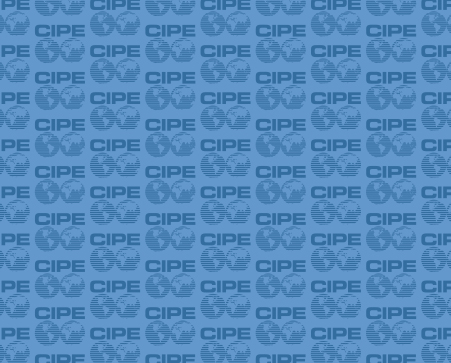
Ecuador, the land of the eternal spring, the Middle of the World, and the Galapagos Islands, is also a land where nearly 26 percent of the population lives below the poverty line. Seven of every ten people are employed informally — meaning they lack official contracts and may not be subject to worker protections — and over half are employed by businesses that are not legally registered. The entrepreneurial context in Ecuador is characterized by young entrepreneurs (73 percent are younger than 44 years old) with a variety of motivations: increasing their income, seeking independence, necessity, among others.
As of 2010, Ecuadorian women surpassed men in number of entrepreneurs (54 versus 46 percent). Entrepreneurship has long been recognized as a key source of empowerment and economic independence for women around the world, and particularly in Latin America.
The Emprendedores Ecuatorianos program, organized by CIPE partner the Ecuadorian Institute of Political Economy (IEEP), works to foster democratically and free-market minded entrepreneurs from the rural areas of Ecuador. To date, 45 women have completed the Emprendedores Ecuatorianos program. One of the 2013 graduates, Brenda Sumba, shared some of her thoughts on women as entrepreneurs.
From an economic perspective, a woman is an economic agent; from a social perspective, she is an agent of socialization and change. Women’s participation in the current changes needed in our society represent sustainability.
Women are entrepreneurs by nature. They focus on finding opportunities before their resources are exhausted. In other words, women exceed expectations, especially in leadership.
Building a company or a business is not easy. It’s not just fulfilling legal requirements and acquiring a set economic amount. Creating a company is about acting like an entrepreneur throughout your entire life, in all aspects.
I recommend asking yourself the following questions:
- What do I desire to create?
- Do I understand what my product will offer the market?
- How much time do I expect it to take to expand my market?
- Am I flexible to changes in the environment?
If your answers to these questions are concise, with sufficient arguments and you have an adequate team, then it is your hour to debut as an active entrepreneur in the market.
Currently, my company is two years old and, I can say from first-hand experience, that this task has caused me to restructure my objectives from my initial expectations because you realize that being in this market the demands, as much as the competencies, dominate and determine your economic activity. On top of that, you pour yourself, your time, and your investment into the income, costs, and expenses because you know that the results will determine your next economic cycle. In other words you become a specialist in analysis and innovation.
Always remember:
“Risk introduces you to the business person, but leadership to the entrepreneur.”
Brenda Sumba G.
Brenda Sumba is a 2013 graduate of the Emprendedores Ecuatorianos (IEEP) program. She is 23 years old and studies at the Universidad Técnica de Machala, in El Oro, Ecuador. She is studying economics with a focus on business and finance. Her business is Servicios Electricos S.A. Seletmasa, which services low and medium voltage electrical networks, installs air conditioners, and other general electrical work.
Introduction and translation by Laura Boyette, Program Coordinator for Latin America & the Caribbean at CIPE.
Published Date: March 10, 2015